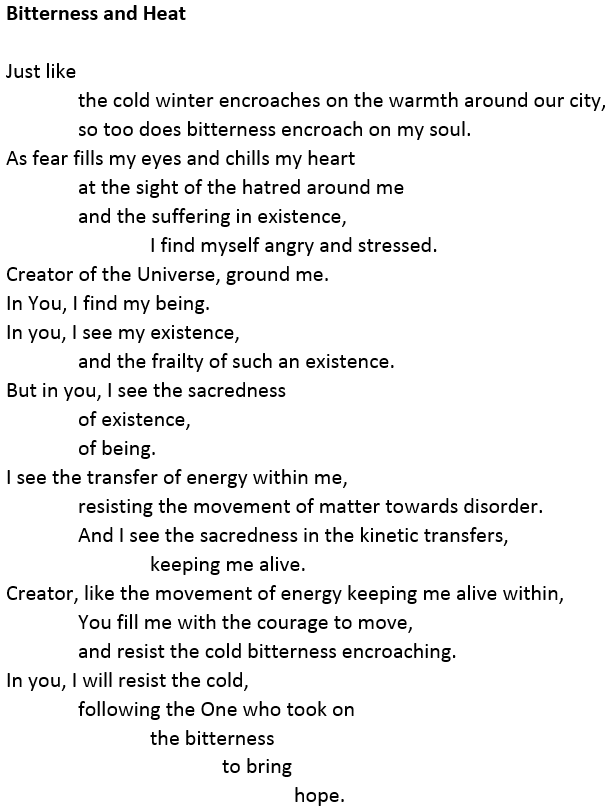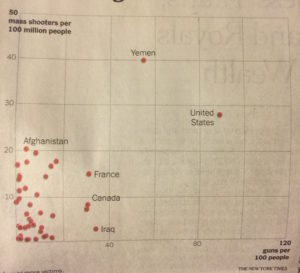“Here I am, my identity in the collection of stories that inspire and drive me. Here I am, another paintbrush in the great canvas of Boston University.
Here I am, my biology telling a story: I am Hispanic and the language in my biology carried by generations of farmers and workers who lived in Colombia. This biological language in me now having traveled thousands of miles into the city of Boston.
Here I am, a calculator with feelings, like Wall-E. A Rodriguez, another one who constantly thinks about how much love matters.
Here I am, an engineering student. A person who loves math and science. A tinkerer.
Here I am, a Christian, an intern at Marsh Chapel. A person who loves reading theology, philosophy, and psychology. A lover of the humanities. A person who takes deep interest in these topics. Someone who came from Mendham Hills, from the youth group of Steve. A questioner. A person who deeply loves pluralism and diversity.
Here I am, telling my story, and inspired by the stories I find those around me telling.
- A confusing-to-understand-why-did-I-exactly-write-this-? reflection I made in a blog post over a year ago
Identities are a wonderful thing. These social constructs help us as human beings add meaning and values to our humanity and perspectives. They come into existence both by choices we make, the nurturing of our societies, and the nature of our beings. I mean, yeah I am a pretty nerdy, sappy, optimistic man. I am a student in ENG. I am a thinker, but also a feeler. I am Hispanic. I am Christian.
I really like that academic-looking, old-school, grey cardigan that I’ve had for many years since high school. I also really like skateboarding. I love fishing.
Identities are wonderful because they give meaning to our places in social contexts. They allow defined expressive existence in the various facets of society.
But, identities also allow often-inappropriate assumptions to be made about individuals, as was brought up at an interfaith discussion at Hillel’s interfaith Shabbat a few weeks ago.
I am pretty nerdy. Does that make me unable to socialize? Not at all. Well, I mean I think I can socialize.
I am in ENG – or in non-BU terms, an Engineering Student, I am in STEM – does that mean I think the arts, humanities, and social sciences are useless? Not at all! The social sciences accurately help us understand human social systems, the humanities help us better compile ideas and themes in the human experience, and the arts, in my honest opinion, most accurately capture human experiences comparatively to all other fields of study. Human experiences are most accurately expressed in art.
Does being an engineering student mean I am in it solely for the money? Not at all as well! I actually came into BU studying electrical engineering – I wanted to save the environment. I really loved math and science. I kind of discovered I really don’t like electromagnetism (although, recently, it has grown on me again), and switched to computer engineering. I was never in it for the money.
I am a Christian – does that mean I hate science, women’s rights, and the rights of LGBT individuals, or share the political views of the president of Liberty University? To many people in my life, both Christian and non-Christian, the assumption is yes, I do.
I do not, though. That would be far from truth. I do not at all. Although many fellow Christians would disagree, that would in fact – in my humble opinion – be as unChristlike as behavior can be. As many people often repeat about individuals who share my faith, Mohandas Gandhi was once quoted, commenting on Christianity, “I like your Christ, I do not like your Christians. Your Christians are so unlike your Christ.”
Assumptions about people can be dangerous. But, in all honesty, the basis for why we as humans make assumptions makes complete evolutionary and cognitive sense: it takes less energy to make assumptions based on preconceived notions arising from experiences, and therefore allows judgements about life decisions or social situations easier. If there was someone in a clown costume standing 10 feet ahead of me wielding a weapon of a sort and just staring at me, it makes sense that, after last year’s social clown panic and many tropes of the creepy dangerous clown, I might assume this is a dangerous individual and I need to take immediate action for my own safety.
That is an extreme example, but it explains why assumptions happen, and their occasional value.
But suppose I come across another individual, be it a person of a certain race, sex, gender expression, sexual orientation, political view, religion, national identity, etc. What assumptions will I be carrying? Will I give this individual the respect they deserve? What keeps me from having negative assumptions?
During the interfaith Shabbat’s discussion, I came upon a few reflections on how to reduce the impact of such negative assumptions and biases. I think these actions will help us as individual reduce our tendency towards making negative assumptions.
One way to do this is to – and I know this is scary and hard to do – have open dialogues, conversations, and interactions with those who do not share similar perspectives and identities. Dialogue helps us see the common humanity we share, and it will help us grasp a better idea of experiences and perspectives that differ from our own. This will help build empathy and mutual understanding.
Another way is to understand our own limitations in our humanity. I really really really do not have answers to every question. I certainly cannot solve every problem that exists. I have not lived every human experience that has ever occurred in human history nor have the people I look up to and draw identity and ideas from. The art I draw meaning from doesn’t capture every experience or emotion in the world, and every school of thought I draw ideas from does not solve every problem – and that’s okay. No perspective can do that – and any perspective that implies they do, or attempts to, will only further detract from solving our world’s current issues we face today. It takes a perspective with a limited, specific lens to face a global issue, and it takes humbleness to know that many different specific perspectives will ultimately solve the issue, and not simply multiple copies of a single, specific, lens.
And finally, celebrate the diversity and differences in our identities and constructs. We really are all like different paintbrushes painting on a massive canvas. If we existed in a world where everyone was exactly like me: a Hispanic, straight, male, progressive Christian, liberal, STEM major, religious, sappy, optimistic human, it would most certainly not be utopian world – and it most certainly would not be heaven.
I think the Kingdom of Heaven would contain much, much more of the diverse human experience.

